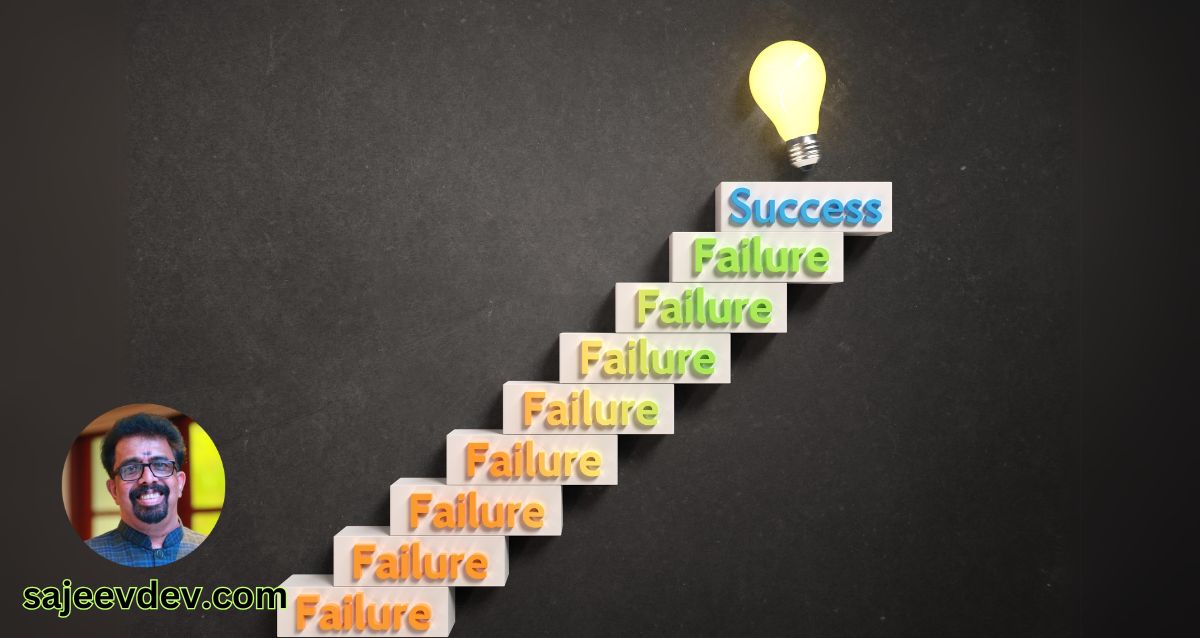Failure is an inevitable part of any journey toward success. It can be disheartening, even devastating, but the way we view and handle failure determines whether it becomes a stepping stone or a permanent barrier. Rather than seeing failure as the end of the road, we must understand it as a natural part of growth and progress. Each failure is an opportunity for learning, refining, and becoming more resilient.
The Role of Failure in Personal Growth
Failure isn’t just an obstacle to be overcome; it’s a teacher. Each time we fail, we gain critical insights into what went wrong and how we can improve. Whether in business, relationships, or personal goals, every misstep brings valuable lessons that contribute to eventual success. Without failure, we wouldn’t be able to grow as individuals. It shows us where we need to improve, develop new skills, or adjust our strategies.
When we fail, we’re forced to confront our limitations and weaknesses. This can be uncomfortable, but it also drives personal growth. It’s through overcoming these limitations that we find strength and resilience. Every failure sharpens our focus and builds the kind of character necessary to handle bigger challenges ahead.
Why Failure is a Stepping Stone, Not the End
Many successful people have experienced failure—sometimes multiple times—before reaching their goals. For example, Thomas Edison is famously quoted as saying, “I have not failed. I’ve just found 10,000 ways that won’t work” when discussing his attempts to create the electric lightbulb. This mindset is a key element in success: understanding that failure is part of the process.
The world’s most successful entrepreneurs, scientists, and innovators faced failure numerous times. What separates them from others is their ability to persist and view each failure as a step closer to success. Failure becomes a stepping stone when we extract the lessons from it and use that knowledge to adjust our actions. By learning from mistakes, we can pivot, innovate, and refine our approach.
Failure Provides Clarity
One of the greatest gifts failure offers is clarity. When you fail, it often becomes clear what doesn’t work, and sometimes, what does. Through trial and error, you eliminate unproductive paths and refine your methods. Failure helps you cut through the noise and focus on the strategies that move you closer to your goals.
For instance, in business, a failed product launch can reveal key market insights, customer preferences, or operational inefficiencies that need to be addressed. In personal development, a failed attempt at achieving a goal can highlight areas that need improvement, such as discipline, time management, or mental resilience. By embracing these lessons, you become more equipped for success in the future.
The Psychological Shift: Embracing Failure
To truly see failure as a stepping stone, we must shift our mindset. Many of us are conditioned to fear failure from a young age, associating it with shame or inadequacy. But those who view failure as an opportunity rather than a setback are better able to maintain motivation and resilience in the face of adversity.
Here’s how to make that psychological shift:
- Reframe Failure: Instead of seeing it as a mark of incompetence, view failure as valuable feedback. Every failure contains a lesson that helps you improve.
- Build Resilience: Understand that setbacks are temporary. Resilience is key to bouncing back stronger from failure. Each time you rise after a fall, you’re mentally preparing for the next challenge.
- Focus on the Process: Success isn’t just about achieving the end goal; it’s about the learning and growth that occurs along the way. When you focus on progress rather than perfection, failure becomes part of the process of becoming better.
- Learn to Let Go of Perfectionism: Expecting perfection sets you up for disappointment. Instead, aim for consistent improvement, understanding that mistakes are natural and valuable.
Examples of Failure Leading to Success
- J.K. Rowling: Before becoming the world-renowned author of the Harry Potter series, Rowling faced numerous rejections from publishers. At her lowest point, she was jobless, divorced, and struggling as a single mother. But she didn’t give up. Rowling’s journey is a testament to persistence and belief in one’s work, even when faced with overwhelming obstacles.
- Walt Disney: Before Disney became a media and entertainment empire, Walt Disney was fired from his first job at a newspaper because he “lacked creativity.” He also faced several failed businesses. Despite early struggles, Disney’s vision for animation and storytelling eventually transformed the world of entertainment.
- Steve Jobs: After being ousted from the very company he co-founded, Jobs could have viewed his career as over. Instead, he founded new companies, one of which (Pixar) revolutionized animated films. Jobs later returned to Apple, leading it to become one of the most valuable companies in the world.
Turning Failure into Opportunity
To use failure as a stepping stone, we must develop resilience and learn to extract value from every setback. Here are some actionable steps for turning failure into an opportunity:
- Reflect on the Experience: Take the time to reflect on what went wrong and why. Was it a lack of preparation, resources, or timing? Identify the areas for improvement.
- Apply the Lessons: Once you’ve identified the reasons for failure, adjust your approach. Whether that means changing tactics, building new skills, or adopting a new mindset, the key is to keep moving forward.
- Stay Persistent: Every successful person has a story of persistence. Don’t let one failure—or even multiple failures—keep you from pursuing your goal. The only true failure is giving up entirely.
- Seek Feedback: Often, we’re too close to a situation to see it clearly. Seeking feedback from others can offer new perspectives and insights on how to improve.
Failure as the Foundation of Success
Success isn’t about avoiding failure—it’s about learning from it. The more we accept and embrace our failures, the stronger we become, and the closer we move toward our goals. Failure is an essential stepping stone in every journey, providing lessons, clarity, and opportunities for growth.
In the words of Winston Churchill, “Success is not final, failure is not fatal: It is the courage to continue that counts.” When we shift our mindset to view failure as part of the process, we unlock our full potential and open the door to lasting success.








